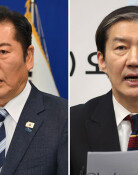Steve Jobs` pioneering spirit
Steve Jobs` pioneering spirit
Posted October. 07, 2011 04:20,
The absence of Steve Jobs, dubbed legendary IT guru, appeared too obvious. Tim Cook, the new CEO of Apple, introduced the iPhone 4S, successor to the iPhone 4, Wednesday just one day before Jobs passed away. The new device lacked elements of innovation, however, while Cooks presentation hardly resonated with people. This caused many to doubt Apples future.
Jobs life in itself constituted the history of IT. At age 20, he entered the field by assembling personal computers with his friend Steve Wozniak at his own residence. Jobs presented a string of innovative products ranging from the Macintosh, 3-D animation and the iPod to the iPhone and iPad, opening a new chapter in the IT culture of humanity. Willing to take risks, he did his best in creating something new and valuable. Jobs truly symbolized entrepreneurship and was a role model to be followed. As his colleagues would say in Apples early years, We did not work for money. We worked to change the world, Jobs truly had a grand vision and passion to change the world with computers and made tireless efforts accordingly.
His achievements all stemmed from his invincible pursuit of creativity and ceaseless challenge, which allowed him to overcome despair and risk failure. When most people were unaware of what a computer was, he created the Macintosh with the conviction that the PC era would be ushered in. The Mac, however, was eventually surpassed by Microsoft, which was armed with the Windows operating system. Realizing the importance of software, he thought of a system that allows the downloading of music and introduced the iPod at a time when most people were listening to music via cassettes and CDs. He also made the world smarter by introducing the iPhone, which integrates a mobile handset with search functions. He also dismantled the public stereotype of computers with the tablet PC, which is different from a desktop and laptop computer.
Jobs aggressive and ruthless management style often caused controversy. He treated products from companies other than Apple as garbage, and criticized them by resorting to different means like lawsuits or smear campaigns. He was also quick to fire executives and staff who clashed with him. Jobs was also not interested in workers human rights and wages at Apples subcontractors. Despite all this, Jobs will be remembered as the worlds most creative entrepreneur who made great contributions to improving human welfare and quality of life.
For Korea to survive and thrive in the IT environment in which a new technology can replace the old in just one day, the country also needs leadership of creativity and innovation like that of Jobs. At Stanford Universitys commencement ceremony in 2005, he stressed the slogan, Stay hungry, stay foolish, which might be his farewell message to humanity as an IT pioneer and devil.



![[단독]이혜훈 “장남 다자녀로 연대 입학”…당시 그런 전형 없었다](https://dimg.donga.com/c/138/175/90/1/wps/NEWS/IMAGE/2026/01/23/133215083.1.jpg)
![하버드 의사가 실천하는 ‘뇌 노화 늦추는 6가지 습관’ [노화설계]](https://dimg.donga.com/c/138/175/90/1/wps/NEWS/IMAGE/2026/01/22/133210626.3.jpg)

![[단독]“5000만원씩 두 상자…윤영호 ‘王자 노리개 상자’ 권성동에 건네”](https://dimg.donga.com/c/138/175/90/1/wps/NEWS/IMAGE/2026/01/23/133215085.1.jpg)
